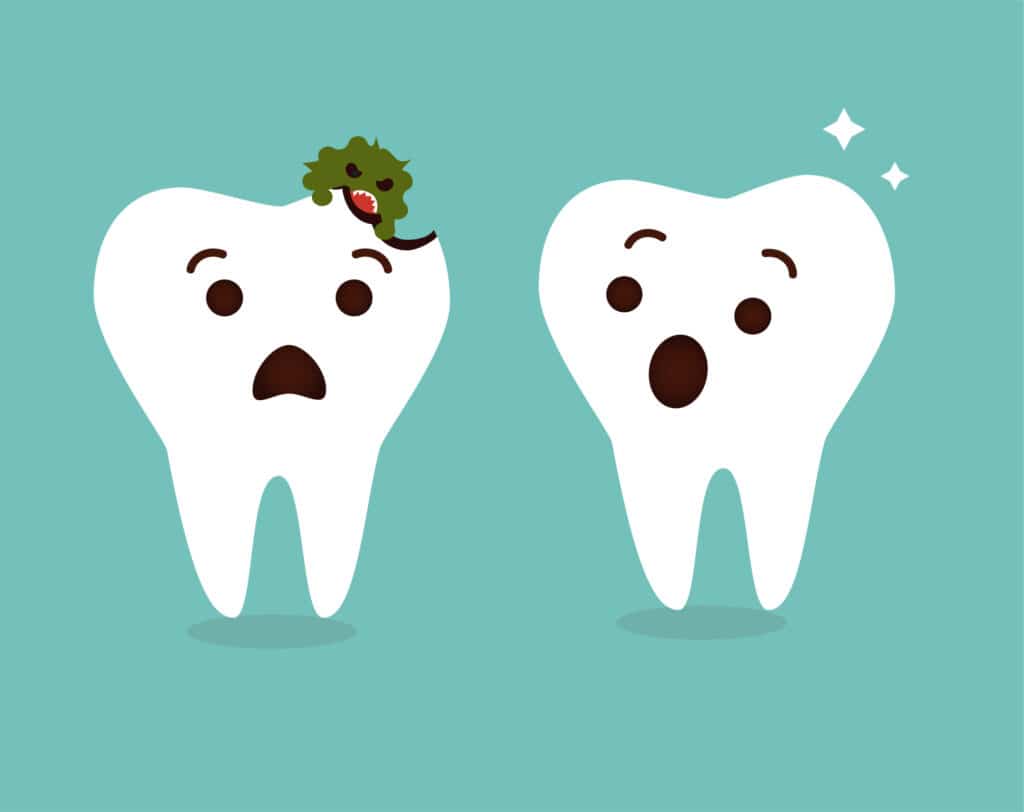Dental health is crucial to our overall well-being. One common issue that many people face is the formation of holes in their teeth, often referred to as cavities. Let’s explore how holes in teeth happen, how to detect them, how to prevent them, and what can happen if holes in teeth continue to get worse.
How Holes in Teeth Happen

In some cases, these very small holes in teeth might be invisible to the naked eye, and other times a dentist can point out cavities that aren’t initially noticed. If the holes in teeth aren’t addressed, they can become bigger, and you may notice this and begin to experience pain and sensitivity. But how do holes in teeth happen? Let’s take a closer look at what causes holes in teeth.
Concerned about tooth decay?
Make an appointment with a Las Vegas dentist today
Bacteria and Plaque
Our mouths are home to millions of bacteria. While some bacteria are beneficial, others can be harmful. These harmful bacteria feed on the sugars and starches from the food we eat, producing acids in the process. When these acids combine with saliva and food particles, they form a sticky film called plaque that adheres to the surface of our teeth. These bacteria tend to congregate in the low points on and around teeth, which may include spots around the gums or the pits and grooves between cusps on the molars.
Acid Attack and Tooth Decay
Plaque is particularly dangerous because it holds acids against the teeth. Over time, these acids can erode the enamel, which is the hard, protective outer layer of the tooth. As the enamel weakens, it becomes porous and susceptible to further acid attacks. Enamel is very tough, but it isn’t a living structure and it can’t regenerate like other parts of our bodies. If left unchecked, the erosion progresses through the enamel and reaches the softer dentin layer underneath, eventually creating a hole in the tooth or cavity.
How to Detect Cavities
As previously mentioned, you might not always notice the small holes in teeth as they’re forming. These holes start off very small, and they’ve often not noticeable to the naked eye. Some of these symptoms can help you notice if you have a cavity.
Early Signs and Symptoms
Detecting cavities early can prevent more severe dental issues. Some early signs of cavities include:
- Tooth Sensitivity: A sudden sensitivity to hot, cold, or sweet foods can indicate enamel erosion.
- Visible Holes or Pits: In more advanced cases, you might see small holes or pits on the surface of your teeth.
- Pain and Discomfort: A persistent toothache or pain when biting down can be a sign of a cavity.
- Dark Spots or Stains: Brown, black, or white spots on your teeth might indicate decay.
How to Prevent Holes in Teeth
Good Oral Hygiene Practices
Bacteria and the acids they produce cause holes in teeth. But good oral hygiene is the best way to wash away these bacteria and their acids. These oral hygiene routines will get rid of bacteria and acids before they can eat away at the tooth enamel and make a hole in the tooth.
- Brush Twice Daily: Use fluoride toothpaste and brush for at least two minutes each time. The fluoride in toothpaste can help to remineralize tooth enamel, fortifying it against attacks from bacteria.
- Floss Daily: Flossing removes food particles and plaque from between the teeth where a toothbrush can’t reach. This can help to prevent small holes in teeth that can form near the gums.
- Use Mouthwash: An antimicrobial mouthwash can help reduce bacteria in the mouth.
- Limit Sugary and Acidic Foods: Reduce the intake of sugary snacks and drinks, as well as acidic foods that can erode enamel.
Fluoride Treatments and Dental Sealants
Fluoride strengthens tooth enamel, making it more resistant to decay. Fluoride bonds with the calcium phosphate in tooth enamel and strengthens the hydroxyapatite with fluorapatite. Many municipal water sources add fluoride to their water supply to help protect teeth, and fluoride treatments are available at dental offices. Dental sealants are another preventive measure. These are thin, protective coatings applied to the chewing surfaces of the back teeth, where cavities often form.
Regular Dental Check-Ups
Regular dental check-ups are essential for detecting cavities early and preventing them. Dentists use tools like X-rays and dental probes to identify cavities that may not be visible to the naked eye. Professional cleanings also help remove plaque and tartar, reducing the risk of cavities.
Consequences of Ignoring Cavities
Increased Pain and Discomfort
If a cavity goes untreated, it can lead to increased pain and discomfort as the decay progresses. The pain can become severe, making it difficult to eat, drink, and even sleep.
Infection and Abscess
As decay reaches deeper layers of the tooth, it can cause an infection. An abscess may form at the root of the tooth. This red, swollen area can cause intense pain, fever, and it can even spread to other parts of the body.
Tooth Loss
If left untreated, the decay can destroy the tooth structure to the point where the tooth needs to be extracted. Tooth loss can affect your ability to chew and speak properly and may require expensive treatments like dental implants or bridges.
Overall Health Implications
Oral health is closely linked to overall health. Poor dental health has been associated with conditions like heart disease, diabetes, and respiratory infections. Therefore, maintaining good oral hygiene and addressing cavities promptly is essential for your overall well-being.
Holes in teeth, or cavities, are a common dental issue that can lead to significant discomfort and health problems if not addressed. By recognizing the signs of decay and maintaining good dental hygiene, you can prevent holes in your teeth and maintain a healthy smile. Don’t ignore the signs of tooth decay—take action to protect your teeth and overall health! Contact us today to make an appointment with a dentist in Las Vegas and the surrounding area.


